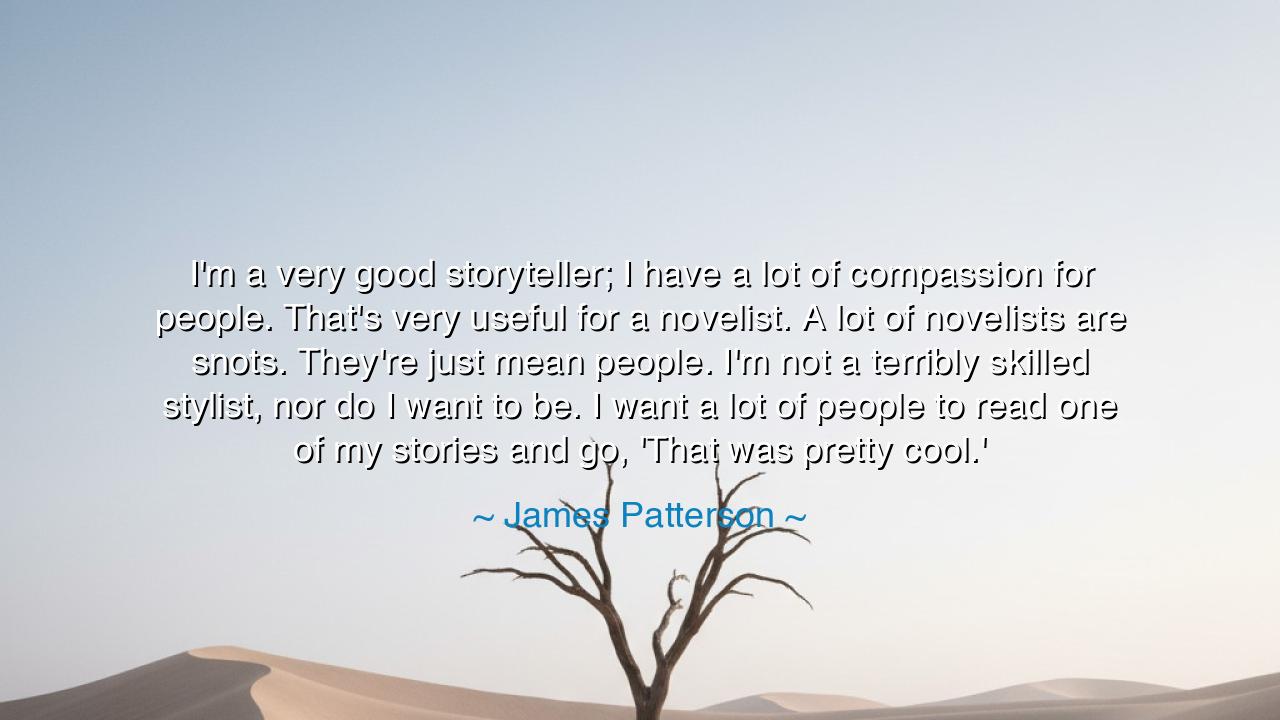
I'm a very good storyteller; I have a lot of compassion for
I'm a very good storyteller; I have a lot of compassion for people. That's very useful for a novelist. A lot of novelists are snots. They're just mean people. I'm not a terribly skilled stylist, nor do I want to be. I want a lot of people to read one of my stories and go, 'That was pretty cool.'






The storyteller James Patterson, a craftsman of tales known to millions across the world, once spoke with rare humility and insight: “I'm a very good storyteller; I have a lot of compassion for people. That's very useful for a novelist. A lot of novelists are snots. They're just mean people. I'm not a terribly skilled stylist, nor do I want to be. I want a lot of people to read one of my stories and go, 'That was pretty cool.'” These words, though wrapped in humor, reveal the heart of a man who values the soul of storytelling over the vanity of style. They are a reminder that the true power of art lies not in ornament, but in connection — not in how clever the words are, but in how deeply they move the human spirit.
In the manner of the ancients, let us look beneath the jest and find the wisdom within. When Patterson speaks of being a storyteller rather than a stylist, he reminds us that art, at its truest, is an act of service. The storyteller is not a god perched above the people, but a bridge between hearts. The compassion for people that he names is the lifeblood of his craft. For what use is mastery of language without empathy? What good is elegance of style if it leaves the soul untouched? Patterson’s creed is simple yet profound: that the writer’s task is not to impress, but to reach, not to decorate truth, but to deliver it in a way that others can feel and understand.
The origin of these words lies in Patterson’s lifelong devotion to accessibility — his belief that stories should belong to everyone. In an age when many writers chase prestige or critical acclaim, he sought instead to awaken the love of reading in all — children, workers, dreamers, those who might never have called themselves readers at all. He has written hundreds of novels, across genres and ages, always with the same intent: to entertain, to comfort, to connect. His quote is a gentle rebellion against elitism — against those “snots,” as he calls them, who use art as a weapon of exclusion rather than inclusion. In his view, the highest calling of a novelist is not to be admired, but to be understood.
Consider, for a moment, the legacy of the ancient Greek poet Homer, whose works — The Iliad and The Odyssey — have outlasted empires. Homer’s language was not meant for scholars alone; it was meant to be sung in the firelight, shared among farmers, soldiers, and sailors alike. His power lay not in sophistication but in universality, in his ability to awaken the emotions common to all mankind — courage, grief, love, and longing. So too does Patterson walk in that tradition. He speaks not to critics but to the common heart. Like Homer, his greatest virtue is not perfection, but passion; not polish, but compassion.
When Patterson admits that he is “not a terribly skilled stylist, nor do I want to be,” he reveals a deep truth about humility in creation. The artist who chases beauty for its own sake risks losing sight of why beauty matters. Style without sincerity becomes vanity; intellect without empathy becomes cruelty. Patterson’s words remind us that it is not the complexity of the language that moves people — it is the truth beneath it. The mean novelist, who writes only to prove his superiority, builds towers of words that no one wishes to climb. But the storyteller who writes from compassion builds doors that all may enter, and through those doors walks the enduring power of human connection.
O seekers of meaning and craft, take this teaching to heart: speak to be understood, not to be admired. In your art, your work, your words, choose clarity over arrogance, compassion over cleverness. Whether you write, lead, or teach, remember that greatness is not found in being above others, but among them. The humble storyteller who touches one heart has achieved more than the proud genius whose brilliance blinds the world. Let your talent serve, not elevate; let your voice invite, not intimidate.
And so, the lesson of James Patterson’s wisdom endures: art without compassion is hollow, and style without substance is dust. The purpose of creativity is not to impress the few but to inspire the many. When you create, do so with kindness. When you speak, do so with sincerity. Strive not to be flawless, but to be felt. For in the end, it is not the grandeur of your words that will be remembered, but the warmth of your heart — the moment someone, somewhere, closes your book, lifts their eyes, and whispers with a smile, “That was pretty cool.”






AAdministratorAdministrator
Welcome, honored guests. Please leave a comment, we will respond soon